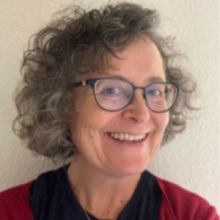
How UCSF Nurses are Expanding Access to Home Visiting Programs
Evidence-based public health nursing maternal and child home visiting (HV) programs show great promise for optimizing both the health of pregnant people and the health of their children and families.
That’s especially true when implementing a trauma-informed HV model, since traumatic experiences, which can range from things like sexual assault to food insecurity, can have significant health effects, especially when they are experienced during childhood.

Putting this kind of trauma-informed approach into a HV program “acknowledges that a person has had these experiences, and takes that into consideration when evaluating clients,” said Carol Dawson-Rose, PhD, RN, FAAN, professor and dean of the UCSF School of Nursing. That leads nurses to “create an environment that accepts the whole person for everything they’ve experienced.”
Nurses at the UCSF School of Nursing are leading the way in expanding access to this model of supporting the training of public health nurses to run trauma-informed HV care in six counties in California through the Trauma-Informed Approach in Public Health Nursing (TIA PHN) program. So far, they have reached more than 1,000 families who have received these types of home visits at the earliest stages of their child’s life, conducting research to show that the model works, especially for this vulnerable population.
“Based on our training and understanding of the importance of community and the role of public health, we’re well positioned to really drive change,” said Ifeyinwa Asiodu, PhD, RN, FAAN, associate professor and principal investigator on this research.

Expanding HV Services to Families Who Need Them the Most
While clinical research demonstrates the effectiveness of the HV model for pregnant people, eligibility requirements for evidence-based HV models are very strict. In fact, requirements are so strict that they often exclude families that need these services most. For example, most HV programs will only work with someone having their first child, and only if they can start working with the pregnant person before a specific stage in their pregnancy. That leaves out people who are already parents or people that reach out for prenatal care later in their pregnancy.
The TIA PHN program “catches a bigger group than many public health programs and public health nurses typically work with and creates a new framework to bring that population into public health nursing home visiting care,” Dawson-Rose said.

The program was started “so that we could deliver an evidence-informed model to families who fell outside of the criteria of standard HV models,” said Julianne Ballard, MSN, RN, PHN, current student in the PhD in Nursing program who is working on this project. “There’s evidence that this kind of program would address maternal mortality and infant mortality and social health of the family going forward. Why should that be something hard for people to access?”
A trauma-informed approach, like the one TIA PHN home visitors are using and are trained in, takes the whole person (and family) into account, because ignoring the reality of their daily lives won’t help them on the best path forward.
That means recognizing things like intimate partner violence, sexual violence and PTSD, but also what is affecting these families every day, including racism, poverty and food and housing insecurity, which is more likely to impact people from racial minority communities.
“The accumulation of those daily stressors has an impact physically, psychologically and mentally,” said Asiodu, who took over as principal investigator on this project in July. “Nurses in the program have this training to guide individuals and families during a really critical period of time to help improve their outcomes for themselves and their infants and children.”
Nurses are also trained in anti-racism and cultural humility, said Ballard. “We’ve been very successful at turning around situations with a lot of passionate home visitors who have so much to offer clients,” she said. “They respect and want to serve their communities so badly without creating a re-traumatization or secondary trauma.”
Helping Families Across Northern California
In the first cycle of this grant-funded work, which ran from July 1, 2021, through June 30, 2023, the program enrolled 1,062 families in Napa, San Francisco and Sonoma counties. The research team is currently working on reporting results from that cohort, but they’re not stopping there. The next cycle of grant funding, which runs through 2026, along with support from local communities and public health departments, will add three more counties to the program.
UCSF recognizes that a one-size-fits-all approach won’t work for every county. Asiodu said the team “wants to make sure that we’re supporting communities in the ways that they’re able to meet their own goals.” The team is also working to “affirm and raise awareness about the importance of public health nursing and the importance of nurse-led visiting programs.”
It’s critical for nurses to be doing this work, said Asiodu, because nurses make up the largest component of the health care workforce. “We are very well positioned to impact change and address and eliminate health inequities and disparities,” she said. It’s also timely given the still ongoing COVID-19 pandemic, which has led to additional stressors, like isolation and grief, on an already taxed community.
“Having a program like this, that is supported by the state and by different counties in the Bay Area, and led by public health nurses is really critical and important for the health of our communities,” she said.



